I don’t want to just play one kind of character,” says Maisie Richardson-Sellers. “For me it’s the magic of the moments in-between. It’s the difference, it’s the prep. It’s the, ‘How on Earth am I going to do this?’ How can I create this human?’ – and doing it anyway. That’s where I find the fun. Being scared. Being challenged.”
She’s referring to her extensive screen portfolio but it could just as easily be a personal mission statement. This is a woman who dreamt of being an actor from childhood yet studied Anthropology and Archaeology at Oxford. Upon graduation, she briefly hosted helicopter tours over London. Her first screen role was Star Wars: The Force Awakens. In 2017, she co-founded Shethority, an online global collective for women, and has since started her own production company, Barefaced Productions. Oh, and she can almost certainly smash you at pool.
The pool is an unlikely legacy of The Kissing Booth 2; her character Chloe is a dab hand on the baize. Rather than use a double, Maisie trained with a champion player three times a week and duly sank all her shots while the cameras rolled. This is not a woman who does things by halves.
In hindsight, we really should have done the interview in a dive bar but instead we settle for the slightly more glamorous surroundings of the BFI Bar in Waterloo. (There isn’t a dive bar for miles: I checked.) Naturally I go to the wrong venue – the riverfront café – and so our first few minutes of conversation involve the cheerful exchange of landmarks over the phone. “Can you see the National Theatre? Great! But not the Thames…? Bugger.”
After several laps of Theatre Avenue I get there in the end – figuratively, geographically – and she gives me a big grin and a hug. She’s one of those lovely people who make you feel like their lifelong friend after ten minutes in their company. It’s a real skill: whether practised or inherent I do not know, but I suppose it’s equally impressive either way.
It’s also Friday afternoon so we treat ourselves to proper drinks – white wine for her, a common lager for me – and settle into a nice quiet spot in the corner, perfect for recording an interview. A group of lads promptly plonk down on the adjacent table and start playing videos on a phone; Maisie moves the sofa forward to ensure she’s as close as possible to mine.
She’s come straight from an audition, which can’t be discussed. What can be discussed is Nine Perfect Strangers, the hit American drama series starring Nicole Kidman as a Russian wellness guru. Whereas season one was set in California, season two has relocated to the Austrian Alps. Maisie plays Wolfie O’Clair, girlfriend of the former concert pianist Tina (King Princess). Wolfie is a new type of character for Maisie: exactly how she likes it.
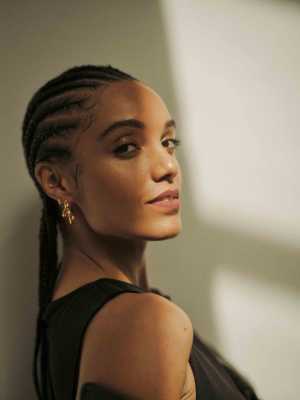
“I normally play quite headstrong, fierce, powerful female characters, and she is very vulnerable. She is very lost in her relationship. She’s very co-dependent on her partner.” Unable to fulfil her own dreams, Wolfie lives vicariously through Tina. “It’s a kind of sad, toxic situation where they’re both freefalling,” says Maisie.
“This retreat is her final attempt to save them both and save Tina’s career. So you watch her on this journey of swimming in the ocean with no land in sight, to finally, you hope, finding her feet – and what happens then…” She takes a beat and grins. “I was going to say what happens then, but I won’t in case you haven’t seen it!”
Sadly not – I wasn’t sent a screener link. Neither, I suspect, were most readers, so let’s stay clear of any spoilers. Instead, let’s discuss the refreshing depiction of an on-screen queer couple whose sexuality does not make up their whole identity.
Maisie openly identifies queer and kicked off the year by getting engaged to her partner, Saba. (Congrats, guys!) She describes Wolfie and Tina as “the next step within representation whereby you’re not just fascinated and fixated on their sexuality. That’s not real. In real life, we are multifaceted, complex individuals and sexuality is one of many facets of us. These characters, they never even talk about the fact they’re queer. You don’t!”
I go through these shifts in self-expression constantly. These oscillations
Smiling, she riffs on the theme. “It’s not like I wake up, ‘Oh, I’m queer today. Oh no, I missed the bus, I’m queer!’ It is not this constant thing. It’s just your lived experience. So hopefully everyone will be able to relate to their relationship in some way because it’s just an honest portrayal of the miscommunication within love.”
Director Jonathan Levine ensured filming was a collaborative process with space for input and improv. “It’s nice working with someone where your creativity is valued and you’re not just sort of a puppet there to perform their dream.” Much homework was done, not a problem for Maisie: you don’t get into Oxford by slacking. (Writes the University of Sussex graduate.) However, Wolfie’s cropped hair was a happy accident rather than creative decision: the day before her birthday, Maisie shaved hers off for the first time in her life.
How come? “I just wanted a different kind of expression. I wasn’t feeling like I identified with the hair at the moment. I go through these shifts in self-expression constantly. These oscillations, I guess, where suddenly I look in the mirror and I don’t recognise myself that much. So then I’ll do something, I’ll change something.” Where does that oscillating self-expression stem from? “I don’t know!”
She takes a moment and makes the comparison with gender. “I like the term ‘gender transcendent’, where it’s not about being this or that or non-binary. It’s just about the constant osmosis and fluidity of gender, of my expression. Sometimes I feel really deep in my masculine. Sometimes I feel really deep in my feminine. Sometimes it’s a total mix of both. So visually it helps to follow through with whatever I’m feeling internally. One day I’ll wake up and I’m like, ‘This is not it anymore.’”
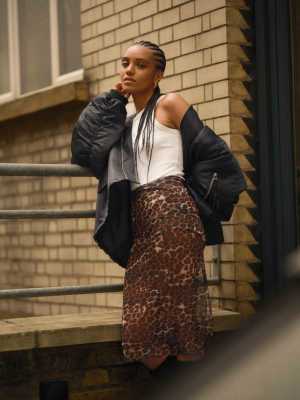
Shop the look: Jacket and skirt: The Frankie Shop; Vest: A Days March; Boots: Jimmy Choo; Earrings: Alighieri
She was raised to be nothing other than herself – whomever that person happened to be. Her parents are both professional actors: Joy Richardson and Trevor Sellers met at the National Theatre while working on a production of the 17th century Spanish play Fuente Ovejuna in 1992. It’s a rare thing to interview someone right across the street from the place their parents fell in love; I’m ashamed to say I don’t think to comment on this proximity at the time.
Maisie describes her upbringing as “bohemian”. Despite their relationship, her parents never lived together: Trevor was based in Brixton, Joy in Dalston. She divided her time between the two houses, sometimes with one parent, sometimes both. At Trevor’s, there was no central heating, electric kettle or TV. “I was very removed from pop culture,” says Maisie. “It’s great now but when you’re at school, you want to be knowing what’s hot.”
She lived on the water: Trevor rebuilt a boat and took his daughter sailing, across the Channel to France, around the Isle of Wight, weeks upon weeks of salt air and open sea. She climbed trees, roamed fields. Her London life revolved around the theatre. She waited in rehearsal rooms, watched plays from the wings. It sounds idyllic, a beautiful blur of nature and imagination, love and enchantment.
How are we related to each other? Some societies believe it’s blood, others believe it’s ritual
“I come at things from a slightly different angle because my brain has not been curated around pop culture and mainstream stuff. I grew up on weird quirky, old-school films, French films, the kind of stuff which most people discover later. That was just my normality. Art house films, global films, global music, global beats – which now are cool but back then it was just me listening to them with my dad.”
She fell in love with theatre aged three, watching her mum perform The Winter’s Tale at the newly reopened Globe. Mark Rylance starred in that production; 25 years later, Maisie would work with him on Channel 4 thriller The Undeclared War. “It’s so live and explosive within him,” she says of Rylance. “There are a lot of actors, sadly, who are quite self-conscious in their work, whereas he is just lost in the moment.”
Her parents encouraged her to attend university rather than drama school, a route Maisie embraced. She knew numerous actors were Oxford alumni and there would be ample opportunities to pursue drama alongside her degree. Indeed it was a student production of for colored girls who have considered suicide / when the rainbow is enuf that led to her being signed by her current agent and “right-hand woman” Suzy Brierley. The pair have spent the past decade conquering their respective industries; “I watched her go from assistant to agent – now she’s head of her own company.”
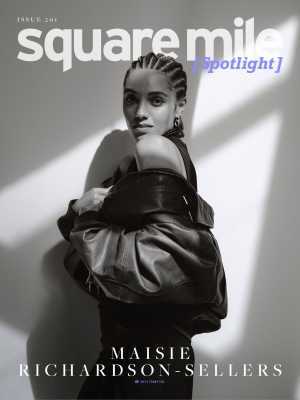
Shop the look: Jacket: Deadwood; Dress: Remain; Jewellery: Alighieri
After graduation she briefly worked for a helicopter company, hosting their London tours; a job that basically consisted of taking people’s photographs, bringing them drinks and occasionally bumming a ride in the helicopter if there was a spare seat. Broader skies beckoned when she landed a small role in Star Wars: The Force Awakens. She auditioned for the lead role of Rey but director JJ Abrams liked her enough to cast her as naval officer Korr Sella.
Her first time on set (any set!) was doing a two-hander with Carrie Fisher. The scene was cut from the finished film but it was released by Abrams after Fisher’s death. “It was amazing,” says Maisie of working with Fisher. “Just to sit opposite her. I had no idea what I was doing. Her grace and kindness and generosity. It was really amazing. She was so cool.”
Aged 22, she moved to America and spent the next decade there. Six of those years were spent in LA, although work dictated she spent large portions of time in Atlanta (filming The Originals) and Vancouver (Legends of Tomorrow). LA was a base rather than a home; and when Covid grounded her there for a sustained period, she decided to relocate to Brooklyn.
The story is vintage Maisie. She was filming in Vancouver, having just ended a long-term relationship that was her only anchor to LA. “It was a mad time,” she says. “A voice just came to me and said, ‘go to New York, move to New York.’ I’d only been to New York twice, for a week, in my life. I didn’t like New York at that point. I’d never connected with New York.” Nonetheless she trusted her instinct. Packed up her stuff, flew across America, and quickly fell in love with her new city.
In America, her career soared. She played a vampire in The Originals, a superhero in Legends of Tomorrow: major roles in blockbuster TV series as well as the two Kissing Booth sequels for Netflix. Like many British actors of colour, she had found the roles available in the UK to be limited – characters tended to be presumed white unless specified otherwise. “There had to be a reason why the character was of colour,” says Maisie. “Rather than, it’s a doctor. It could be anyone.”
She founded Barefaced Productions right before Covid. The remit was simple: give a platform to those who won’t otherwise have one. “It’s all about uplifting marginalised voices,” says Maisie. “Stories told by the people that the stories are about. Behind the scenes, making sure there’s diversity and inclusion from the beginning. The writing, the set is reflective, the crew, all the way through to the actors, the editors, the sound people – everyone.”
Sunday’s Child, a short film she co-wrote and directed, employed a crew that was 80% people of colour and 90% female. Covid meant an inevitable pause – “not a great time for new production companies” – but she’s now preparing to relaunch with her fiancée Saba as a co-founder. Films, TV shows, documentaries: the remit is broad, the passion boundless. Watch this space.
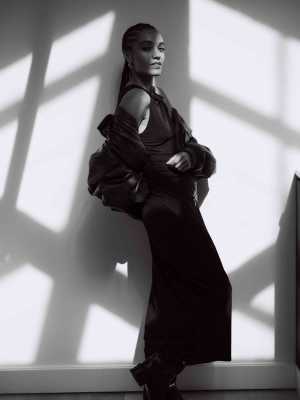
What question would Maisie Richardson-Sellers ask herself? We posed her this question in a 2018 interview; can the 2025 version remember her answer?
“No!” she says with a smile. I invite her to guess. “What would I have said? What would seven-years-ago Maisie have said? My instinct is, ‘what makes you happy?’ or something like that. Or, ‘what makes you feel most inspired?’”
What book are you reading currently? The answer – or rather the question – surprises her. “Is that what it is?” That’s what it is. “That’s what I asked?” That’s what you asked. “I wonder what the reply was.”
Here you go: “Let Me Be Like Water by SK Perry. It is an incredible, honest exploration of the human spirit through friendship, loss and simply existing in this world.Perry has a captivating, poetic writing style that’s a delight.”
So, what books is she reading in 2025? A couple. In the Dream House, the autobiography of Carmen Maria Machado detailing her emotionally and physically abusive relationship with another woman. “It’s such a beautiful roam through life in a very experimental way,” says Maisie. “Every chapter is told with a different writing style. It looks at this concept of the dream house that we build with our lover, and what happens when you get trapped in there.”
She’s also reading On Earth We’re Briefly Gorgeous, the 2019 debut novel by Vietnamese American poet Ocean Vuong. “It’s a letter from this young boy to his mother explaining his life and his queerness whilst knowing that she’s illiterate… So it’s the safety of knowing she’ll never read it but the vulnerability and release of being able to write to her. That’s a very smart, very fantastic book.”
Maisie is a talented writer herself: check out her essay for the website Pulse Spikes about her experience of navigating private school as a mixed-race child. “I suddenly found myself in a very white world. There were only a few children of colour in my year, and I was often the only one in my class. At around 9 years old, I remember noticing that amongst the role models pop culture was handing me, I rarely saw a face that looked like mine. It wasn’t long before I started trying to tame my hair into a more Eurocentric look.”
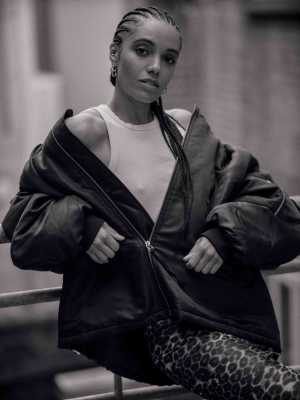
Fascination with the immense, near infinite, diversity of human cultures led her to study anthropology at university. In contrast to subjects such as history or sociology, says Maisie, the purpose is not analysis but observation. You must “remove your voice and just observe and let [people] tell their story. Let them teach you the ways of their community and their history. What is kinship? How are we related to each other? Some societies believe it’s blood, others believe it’s ritual. There are so many different ways.”
What does she believe? “I think it’s fluid. It’s not as obvious as, ‘If you’re my blood then you’re my brother.’ It’s way more nuanced.” She reflects on how family can be found through community and ceremony (e.g. adoption). “As queer people having children, it can’t sadly yet be biologically both of our kids. Doesn’t mean it’s not my child. So I think that breaking away from the Western perspective enables you to diversify your mindset in a really beautiful and potentially very powerful way.”
Kids are not an immediate concern for Maisie and Saba. They met in London at a mingler event for queer filmmakers. Maisie proposed last December while the couple were holidaying in Thailand; Saba returned the favour in April at the site of their first encounter. Saba is Iranian, an award-winning film producer. Her name is written in Farsi on Maisie’s necklace. Their home is being renovated so they’re currently crashing with Trevor in Brixton, along with their LA rescue mutt Kahlo (named after Frida), and presumably not watching any TV.
What about the question Maisie would now ask herself – what makes you feel most inspired? “Nature is a deep source of inspiration to me. And spending time with my fiancée. Literally doing the most mundane tasks, but with her, is comforting. Just talking to her. She inspires me so much; her conversation, the way her brain works. Dreaming up our future together – be that our creative future as collaborators or our personal future.”
Their immediate future will be Glastonbury, having rented a solar-powered van for the festival. Saba is a regular – she even DJs there – but Maisie has never been before. She plans to celebrate with another first: dying her hair in funky colours. “Probably baby blue and purple extensions, like a waterfall. With maybe some space buns or bantu knots.”
Festival Maisie. The latest – but far from the last – version of her self-expression, a bright, brilliant and ever-evolving story that will dazzle us for decades to come.
View on Instagram
Watch Nine Perfect Strangers on Prime
